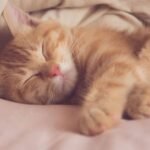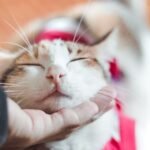Cats have mastered the art of being mysterious. One moment they’re ignoring you completely, the next they’re demanding your undivided attention. Yet when we notice our feline friends getting possessive or acting out when other pets or people enter the picture, we often wonder if they’re truly experiencing jealousy.
Many people including animal behaviorists feel that cats do show a form of jealousy, but it is distinct from human envy. Jealousy in humans is described as “the thoughts or feelings of insecurity, fear, and concern over a relative lack of possessions or safety.” In cats, jealousy can present as aggression; they show aggression toward other cats that threaten their security, especially if their status or territory is compromised. These seemingly jealous behaviors are actually their way of saying “I love you” and “please don’t forget about me.” So let’s dive into the ten most telling signs that your cat’s green-eyed monster moments are really just desperate pleas for your affection.
They Physically Block Your Attention

Picture this: you’re reading a book or working on your laptop when suddenly your cat appears directly between you and whatever you’re focused on. Many people think that cats are displaying jealousy when they try to get in between you and whatever you are doing. They tend to sit on your computer keyboard when you are trying to type, or put themselves in a book you are reading – literally.
Pushing themselves in between you and the object or person that they are jealous of (and not in a subtle way). You may find your kitty stepping in front of your laptop or iPhone or trying to sit on your lap whilst you’re holding your new baby. This behavior isn’t random mischief. Your cat has learned that nothing gets your attention faster than making it impossible for you to ignore them.
Excessive Meowing and Vocalizations

A cat’s main method of communication is her meow, the pitch and tones of which change depending on what she’s trying to tell you. If you’re home doing something other than focusing on her, for example, she may start with a quiet but persistent meow that sounds similar to a newborn’s cry.
Excessive vocalizing is another sign of a cat who is upset or stressed, so some jealous cats may act in this way. The strategic timing of these vocal outbursts reveals their true intention. They’ve discovered that a well-timed meow can pull you away from whatever else has captured your attention and redirect it back where it belongs: on them.
Aggressive Behavior Toward Rivals

Jealousy in cats often manifests as behaviors like hissing, growling, increased vocalization, blocking access, or attention-seeking actions. Key signs a jealous cat might show include: Hissing, growling, swatting, or scratching at objects, animals, or people they see as rivals.
This aggression isn’t born from meanness but from insecurity and love. Cats can become jealous and stressed for several different reasons that have to do with being insecure in some way. Insecurities can arise anytime there are big changes in a household and your cat doesn’t feel in control of their environment. When they lash out at the “competition,” they’re essentially saying they can’t bear the thought of losing their special place in your heart.
Suddenly Becoming Overly Affectionate

Affectionate behaviors could be a sign of jealousy. “For example, your cat may rub up against you more to get their pheromones all up on you,” says Lusvardi. Or your cat may be uber-affectionate and snuggle up close to you when another animal or human is nearby.
Some cats express their jealousy by seeking attention from their owners. They may crowd your space, cuddle next to you, rest on your lap, and ask for pets more often than normal. This ramped-up affection isn’t manipulation in the traditional sense. It’s their way of reminding you of the special bond you share and ensuring they remain your number one priority.
Marking Territory Around the House

Marking their territory around the house or spraying is a common jealous behaviour, especially when you have a new housemate (whether it’s a human or furry roomie!). Marking territory outside the litter box or spraying to claim spaces important to them.
This behavior stems from anxiety about their place in the household hierarchy. They’re not trying to be destructive; they’re desperately trying to reclaim their territory and ensure their scent is prominently featured in spaces they associate with you. It’s their way of saying “this is my home too, and I was here first.”
Pawing at You for Attention

The most obvious sign that your cat wants your attention is when they paw at you. Cats generally do this because it draws your attention to them and makes you notice them quicker. When a cat gently pats their owner’s forehead, it can convey various meanings depending on the context and the cat’s behavior. Here are some possible interpretations: Seeking Attention: Cats often tap or paw at their humans when they want attention, whether it’s for petting, playtime, or simply acknowledgment.
This gentle tapping is incredibly endearing because it shows how much they value your interaction. Rather than being demanding, they’re politely asking for your love and attention using the only method they know will get an immediate response from you.
Following You Everywhere

Cats can be quite social creatures; so many attachment behaviours are actually a normal aspect of their bond with humans. It’s perfectly natural for them to follow you around, seek interactions, and express happiness when you return home.
When your cat becomes your shadow, trailing behind you from room to room, they’re expressing their deep attachment to you. “Sometimes, our pets just want us, and they don’t want to share us with another pet or person.” This following behavior intensifies when they sense competition for your affection, proving just how much your presence means to them.
Knocking Things Over or Being Destructive

“Cats sometimes will lie down on your work table or sit on your computer keyboard to get attention, or even start knocking things off the table,” Dr. Broderick says. Destructive behavior may pop up with cats clawing at things or knocking them over.
“Cats are really, really smart, and they’ll figure out a way to get your attention,” says Lusvardi. They might start to jump onto counters, groom themselves more or become more vocal than usual. This seemingly naughty behavior is actually calculated attention-seeking that proves how desperately they want to be the center of your world.
Hiding or Withdrawing When Upset

More reserved felines might ignore their meals or hide away from everyone. They might display unusually clingy behavior, too.” · Giving the jealous cat extra attention and maintaining his favorite routines goes a long way toward making him happy, she adds.
Other cats react to negative emotions by hiding or evasive behavior, so if your cat sneaks off or avoids other members of the household, those actions can also be clues that a cat is feeling jealous. This withdrawal isn’t indifference. It’s their way of coping with feeling replaced or forgotten, and it’s a clear signal that they need extra reassurance of your love.
Intense Staring to Get Your Attention

Cats have a way of getting our attention simply by staring at us. They seem to have mastered the art of getting our attention by staring intensely at us from across the room and speaking with their “eyes.”
Your cat’s longing gaze could also signal they want to be fed, especially if they do it from their feeding area. However, some cats will stare until we eventually give them attention, whether it is in the form of cuddles, a toy, or their favorite treat. This intense eye contact is their way of silently communicating their need for connection. When they feel jealous, this staring becomes more pronounced as they try to reclaim their special bond with you.
Conclusion

What we often interpret as jealousy in cats is really their unique way of expressing love, attachment, and their deep need for our attention. “Our pets just want to feel loved.” These behaviors, while sometimes inconvenient, are actually heartwarming proof of the strong bond your cat has formed with you.
Rather than viewing these jealous moments as problematic, try to see them for what they truly are: desperate love letters from a creature who can’t use words to tell you how much you mean to them. Understanding these signs can help you respond with the extra affection and reassurance your feline friend is really asking for. What do you think about it? Tell us in the comments.






